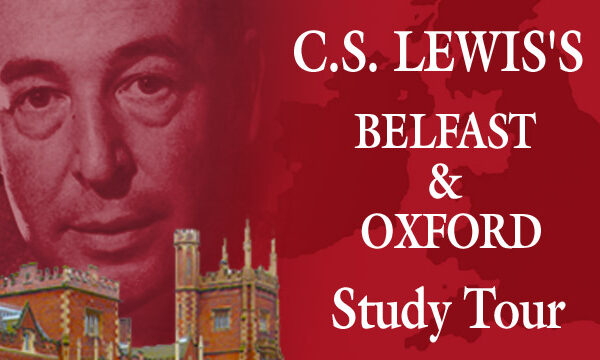Back to series


Art Lindsley’s C.S. Lewis’s Case for Christ
Click here to open a Print - Friendly PDF
With the upcoming film adaptation of C.S. Lewis’s, The Lion, the Witch and the Wardrobe, the market has been flooded with books about Lewis and his work. While it is fair to wonder why anyone would read a book about Lewis when he, or she, could actually read Lewis first hand; nevertheless, there is certainly an audience that would benefit from guided tours that explore his life, fiction, and thought more deeply. Out of the sampling of some of the nearly thirty books being published around the time of the movie release one book, and one book alone, addresses Lewis’s Apologetic vision, and that is Art Lindsley’s C.S. Lewis’s Case for Christ: Insights from Reason, Imagination and Faith (Downers Grove, Illinois: InterVarsity Press, 2005. Paperback, 216 pages).
Dr. Lindsley, of the C. S. Lewis Institute, as an apologist and theologian, walks his readers through Lewis’s most salient arguments for the Christian faith. Lindsley’s breadth of knowledge about Lewis and his grasp of the wide range of Lewis’s writing (there are some 72 Lewis titles and hundreds of books about Lewis) allows him to bring together apologetic insights often missed by the more casual reader of Lewis. Consequently, C.S. Lewis’s Case for Christ makes accessible material that is virtually unavailable in any single source. Furthermore, Lindsley manifests an ability to simplify complexities in Lewis’s arguments, placing both Lewis’s presuppositions as well as his inferences within the reach of the reader. Lindsley also reveals, in many places, an engaging skill that takes Lewis’s arguments further than Lewis himself, thus contemporizing these arguments and applying them to a postmodern context. The book is written as a dialogue, therefore the reader is able to see a modeled application of these arguments and relate them to one’s own conversational experience. The book provides a reader with the wide range of Lewis’s apologetical thought concerning miracles; the problem of evil; the exclusive claims of Christ in light of other world religions; moral relativism; the challenges of postmodernism; and brings it together in a useful single volume. Lindsley begins his study of Lewis’s apologetics by making a clear case as to why Lewis, who died over forty years ago, still speaks with authority today. Lewis’s genius, his breadth of scholarship, his adult conversion from atheism to Christ, his love of argument in the context of true friendship, his gift as a powerful communicator, all establish Lewis’s methods as an apologetical model second to none. Even with this strong explanation of Lewis’s strength as an apologist, Lindsley does not engage in hagiography; he points out that Lewis had his detractors and Lindsley looks openly at their criticisms thus strengthening his [Lindsley’s] own critical judgments.
 As Lindsley’s treatment of Lewis’s arguments progresses, he dismantles the obstacles that Lewis himself had to overcome in his own pilgrimage to faith, developing Lewis’s arguments in the process. This removes the arguments from the realm of mere sterile intellectual consideration and places each one in the more vital context of a real spiritual quest. In this section Lindsley discusses Lewis’s concept of Chronological Snobbery, which rejects a view once held as credible in the past even when it has never been reasonably discredited. Lindsley also develops Lewis’s ideas relative to the Problem of Evil, reminding readers, if evil exists there must be some transcendent standard by which one can even make the judgment that evil exists; thus raising a caution against the all too easy charge that the existence of evil in a world supposedly created by a good and all-powerful God is enough to doubt God’s existence. Lindsley’s development of Lewis’s argument takes into account a free-will theodicy (that moral evil is the result of the ill-use of free-will); and soul-making theodicy (if a good God allows evil to exist then He knows He will bring greater good out of its existence than might have occurred had it not been allowed—this results in good which potentially comes to God’s creatures through suffering). Lindsley also accounts for the emotional stress relative to suffering and admits there may be times when answers may not be forth coming. His argument is not so air tight that he cannot make room for ambiguities and perplexities. Lindsley gives satisfying answers while avoiding that kind of triumphal, and unsatisfying, last-wordism one often encounters in less intellectually robust presentations. It is here however that a reader may disagree with one feature of Lindsley’s presentation and that is his assessment that “Job never receives an explanation for his suffering” (p. 59). It is refreshing to observe Lindsley’s willingness to tackle Lewis’s ideas regarding Myth and the Imagination bringing these often neglected, yet very important, themes into the arena of apologetics. He is right to see the importance of these ideas in Lewis’s corpus and reminds those interested in apologetics not to disregard them.
As Lindsley’s treatment of Lewis’s arguments progresses, he dismantles the obstacles that Lewis himself had to overcome in his own pilgrimage to faith, developing Lewis’s arguments in the process. This removes the arguments from the realm of mere sterile intellectual consideration and places each one in the more vital context of a real spiritual quest. In this section Lindsley discusses Lewis’s concept of Chronological Snobbery, which rejects a view once held as credible in the past even when it has never been reasonably discredited. Lindsley also develops Lewis’s ideas relative to the Problem of Evil, reminding readers, if evil exists there must be some transcendent standard by which one can even make the judgment that evil exists; thus raising a caution against the all too easy charge that the existence of evil in a world supposedly created by a good and all-powerful God is enough to doubt God’s existence. Lindsley’s development of Lewis’s argument takes into account a free-will theodicy (that moral evil is the result of the ill-use of free-will); and soul-making theodicy (if a good God allows evil to exist then He knows He will bring greater good out of its existence than might have occurred had it not been allowed—this results in good which potentially comes to God’s creatures through suffering). Lindsley also accounts for the emotional stress relative to suffering and admits there may be times when answers may not be forth coming. His argument is not so air tight that he cannot make room for ambiguities and perplexities. Lindsley gives satisfying answers while avoiding that kind of triumphal, and unsatisfying, last-wordism one often encounters in less intellectually robust presentations. It is here however that a reader may disagree with one feature of Lindsley’s presentation and that is his assessment that “Job never receives an explanation for his suffering” (p. 59). It is refreshing to observe Lindsley’s willingness to tackle Lewis’s ideas regarding Myth and the Imagination bringing these often neglected, yet very important, themes into the arena of apologetics. He is right to see the importance of these ideas in Lewis’s corpus and reminds those interested in apologetics not to disregard them.
The section of Lindsley’s study that a reader is destined to find most helpful concerns the coherence of Lewis’s apologetic scheme. With skill Lindsley shows how Lewis’s arguments do hold together. Furthermore, as has been mentioned, Lindsley takes Lewis’s arguments further, giving them application in a postmodern culture. The book is generously footnoted, has a helpful index, and supplies an appendix with ideas for further reading to go along with each chapter.
At the end of the day, one must conclude that the overall effect of Lindsley’s investigation of Lewis’s apologetics has been a setting forth of a strong cumulative argument for the Christian faith. The book holds value for those looking to buttress their own faith with a vigorous intellectual support. It has value for the Christian wanting to have answers for a friend or co-worker whose questions seem to stand in the way of his or her believing in Christ. It is also a valuable read for the seeker looking for answers. The book is a good read, its argument artfully developed, and, most of all, it is worthy of Lewis.

Jerry Root
Professor, Christopher W. Mitchell Senior Fellow for C.S. Lewis Studies
Jerry Root is the Christopher W. Mitchell Senior Fellow for C.S. Lewis Studies at the C.S. Lewis Institute; Emeritus Professor of Wheaton College in Wheaton, Illinois and a visiting Professor at Biola University. He received his Ph.D. from the Open University through the Oxford Centre for Missions Studies. Jerry has nine published books, as well as numerous articles and publications about C. S. Lewis and evangelism in other books, journals, and periodicals, as well as read numerous academic papers at various academic venues. Recently, he published, Splendour in the Dark, a book about C. S. Lewis’s narrative poem Dymer (the book also includes Lewis’s 100-page poem). Jerry has lectured on Lewis topics at 79 Universities in 19 different countries.

 COPYRIGHT: This publication is published by C.S. Lewis Institute; 8001 Braddock Road, Suite 301; Springfield, VA 22151. Portions of the publication may be reproduced for noncommercial, local church or ministry use without prior permission. Electronic copies of the PDF files may be duplicated and transmitted via e-mail for personal and church use. Articles may not be modified without prior written permission of the Institute. For questions, contact the Institute: 703.914.5602 or email us.
COPYRIGHT: This publication is published by C.S. Lewis Institute; 8001 Braddock Road, Suite 301; Springfield, VA 22151. Portions of the publication may be reproduced for noncommercial, local church or ministry use without prior permission. Electronic copies of the PDF files may be duplicated and transmitted via e-mail for personal and church use. Articles may not be modified without prior written permission of the Institute. For questions, contact the Institute: 703.914.5602 or email us.
-
Recent Podcasts
A Welcome Change in Apologetics
by Randy Newman, Aimee Riegert on April 19, 2024We’re burdened for our friends who don’t know...Read More
-
Questions That Matter Podcast – Samuel James and Digital Liturgies
by Samuel James, Randy Newman on April 19, 2024
-
The Side B Stories – Dr. James Tour’s story
by Jana Harmon, James Tour on April 12, 2024
-
Recent Publications
Isn’t Morality Relative?
by Christopher L. Reese on April 1, 2024It is widely accepted in the Western world...Read More
-
Do Muslims and Christians Worship the Same God?
by Andy Bannister on March 1, 2024
-
Artificial Intelligence and Its Impacts on Humanity
by John Lennox on February 13, 2024
0
All Booked
0.00
All Booked
0.00
All Booked
20599
GLOBAL EVENT: 2024 Study Tour of C.S. Lewis’s Belfast & Oxford
https://www.cslewisinstitute.org/?event=global-event-2023-study-tour-of-c-s-lewis-belfast-oxford-2&event_date=2024-06-22®=1
https://www.paypal.com/cgi-bin/webscr
2024-06-22

Next coming event
Days
Hours
Minutes
Seconds
GLOBAL EVENT: 2024 Study Tour of C.S. Lewis’s Belfast & Oxford
On June 22, 2024 at 12:00 pmat Belfast, Northern Ireland & Oxford, EnglandSpeakers

Jerry Root
Professor, Christopher W. Mitchell Senior Fellow for C.S. Lewis Studies
Team Members

Jerry Root
Professor, Christopher W. Mitchell Senior Fellow for C.S. Lewis Studies
Jerry Root is the Christopher W. Mitchell Senior Fellow for C.S. Lewis Studies at the C.S. Lewis Institute; Emeritus Professor of Wheaton College in Wheaton, Illinois and a visiting Professor at Biola University. He received his Ph.D. from the Open University through the Oxford Centre for Missions Studies. Jerry has nine published books, as well as numerous articles and publications about C. S. Lewis and evangelism in other books, journals, and periodicals, as well as read numerous academic papers at various academic venues. Recently, he published, Splendour in the Dark, a book about C. S. Lewis’s narrative poem Dymer (the book also includes Lewis’s 100-page poem). Jerry has lectured on Lewis topics at 79 Universities in 19 different countries.





